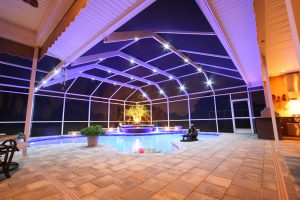 Florida law requires that you enclose your pool. The law was enacted to address the issue of so many children drowning in unsupervised pools. Other serious injuries or death can also occur when the pool is empty. It makes sense that to protect your neighborhood your pool would need to be enclosed with a locking gate.
Florida law requires that you enclose your pool. The law was enacted to address the issue of so many children drowning in unsupervised pools. Other serious injuries or death can also occur when the pool is empty. It makes sense that to protect your neighborhood your pool would need to be enclosed with a locking gate.
But what are you going to enclose your pool with? The laws have few regulations as to the type of enclosure, so long as one is there that prevents small children or animals from entering. That means you can choose from a number of different types of fencing and other options. So why choose a screen room? Here are a few of the pros and cons.
A screened enclosure keeps out insects.
When you get a screened enclosure, it will keep out insects as well as animals and children, and it won’t take away from the sunlight and breezes coming into your pool area. The screens will keep out those pesky flies, gnats, and mosquitoes that can ruin a picnic by the pool.
A screen room keeps leaves, dirt, and debris out of your pool.
If you don’t like to spend a lot of time and effort cleaning your pool, having a screened enclosure can be extremely beneficial. The screen will keep any stray leaves or other natural debris from entering the pool area, saving you time and money.
A screen room complete with roof is more protection for your pool.
If teenagers or troublemakers want to get into your pool, they’re going to exhaust every possible option. If you have a fence, they might try to climb it, squeeze between slats, try to go under, snip thin wire to make an opening, or try to jimmy the lock on the gate. When you have a completely enclosed pool, including a sturdy metal screened roof, their only option is to try to break your lock. That means you only need to monitor one part of the pool area.
If you would like more information about how you might benefit from a screened enclosure for your pool, contact us today.


